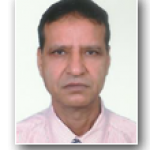 |
Dr Imran Ali E-mail: drimran.chiral@gmail.com Scopus ID: 7102015737 |
Prof. Imran Ali, PhD, FRSC (UK) is a full Professor at Jamia Millia Islamia Central University, India.
He has 25 years of experience in the research, discovery and development of chiral and anti-cancer drugs development. He has more than 500 publications, with total citations more than 25500, 70 h-index and 259,i10-index. He is a member of RSC, UK and ACS, USA. He has been visiting Professor at KSU Riyadh, SQU, Muscat Oman, UTM, Johor, Malaysia. He is on Editorial Board Member of 10 National and International Journals. He is reviewers of more than 50 National and International Journals.
Achievements: Jamia Millia Islamia’s Prof Imran Ali has been selected as a leading scientist in India in the field of Analytical Chemistry by the Standford University in the US.
Prof Ali, who is on the faculty of Jamia’s Department of Chemistry, was ranked 24th in Analytical Chemistry in the world by a group of scientists from the US varsity. He is known the world over for research on anti-cancer drugs.
The list was published in renowned journal PLOS Biology. The world journal published the list of 68,80,389 scientists for excellence in various scientific fields, in a research paper entitled ‘Updated science-wide author databases of standardized citation indicators’ authored by John PA Ioannidis and others.
Twelve other researchers from the JMI have been included in the list of top two per cent scientists across the world.
Prof Ali has so far authored 462 research papers, books, patents etc whereas his technical reports and other presentations in seminars and books have been published in countries like the US, UK and Netherlands.
He is also involved in collaboration with scientists of 12 countries in international research in his field of specialisation.
Research Area: Innovative teaching, Technology in the classroom, Drug discovery and development, Multistep organic synthesis, Pharmaceutical analysis by chromatography and capillary electrophoresis, Sample preparation, Miniaturization in separation science, Simple and chiral separations, Chiral pollutants, Water treatment by new generation nano-adsorbents, Water splitting by nano-materials, Surfactant and Colloidal Chemistry, Executive Leadership.





